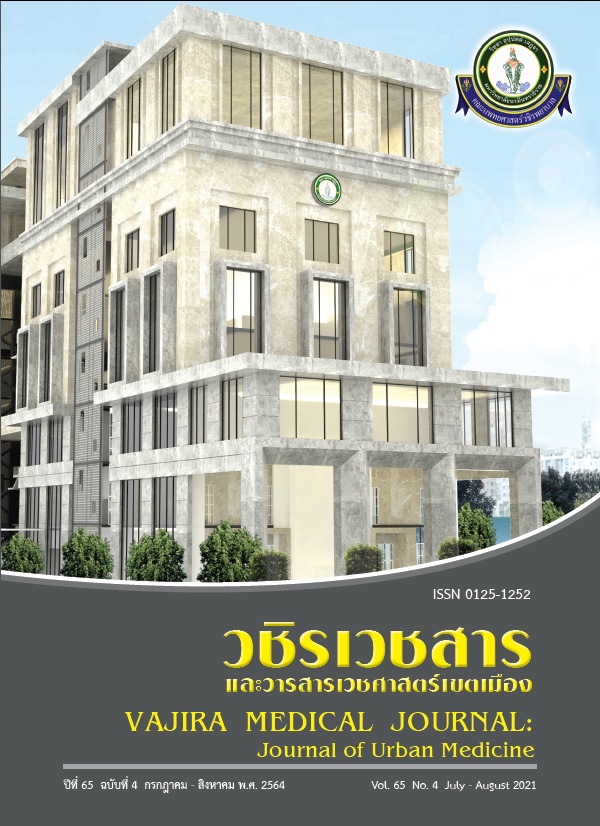Survival Analysis after Surgery of Colorectal Cancer in Vajira Hospital
Main Article Content
Abstract
Background: Colorectal cancer (CRC) is the third most common cancer diagnosed in men and the second most common in women from global cancer statistics1. In 2014, there were an estimated 1,317,427 people living with colon and rectum cancer in worldwide. Approximately 4.3 percent of people will be diagnosed with colon and rectum cancer during their lifetime. However colorectal cancer is one of the cancers that can be prevented by secondary prevention and it can be cured by the detection at earlier stage and early removal tumor. In the past of Thailand, colorectal cancer mostly founded after their complications such as obstruction, perforation or bleeding2 resulting in poorer operative outcome and shorter survival rate than western country. Objective: The aim of this study was to evaluate the incidence of colorectal cancer survival rate within 5 years after surgery, 5 years disease free survival rate and risk factors associated survival outcome in Vajira hospital.
Methods: A retrospective study on 5 year-over all survival rate of patients who underwent major surgical procedure of CRC in Colorectal surgery unit, Department of surgery, Faculty of Medicine Vajira Hospital between January 2010 - December 2011 were reviewed. Overall survival and disease free survival rate of colorectal cancer within 5 years after operation and their risk factors were evaluated. P value less than 0.05 were considered significant. All analysis was done using SPSS software.
Results: A total 185 patients underwent resection of CRC during the study period 111 patients were enrolled, with mean age of 73 ± 19 years. Sixty-six patients (59.5%) were diagnosed with colon cancer and 45 patients (40.5%) were diagnosed with rectal cancer. Stage III colorectal cancer was the most common stage : 57 patients (51.3%). Five year-overall survival rate of 72% (stage I : 89% ,stage II : 80% , stage III : 59%) and median survival time of 84 month. Five year disease free survival rate of 68% (stage I : 89% ,stage II : 75% , stage III : 57%). N Staging was prognosis factors of disease free survival.
Conclusion: The 5 year-over all survival rate was 72% and median survival time was 84 months. The 5 year-disease free survival rate was 68%. The prognostic factors of disease free survival were associated with N staging.
Downloads
Article Details

This work is licensed under a Creative Commons Attribution-NonCommercial-NoDerivatives 4.0 International License.
References
Jemal A, Bray F, Center MM, Ferlay J, Ward E, Forman D. Global cancer statistics. CA Cancer J Clin 2011;61(2):69-90.
Kosin W, Chalongpon S, Krisada P, Wiyada P. The Overall Survival of Colon Cancer Patients in Srinagarind Hospital: 2000-2010, Hospital Based Population. Srinagarind Med J 2015; 30 (2) : 103-9.
Schmoll HJ, Van Cutsem E, Stein A, Valentini V, Glimelius B, Haustermans K, et al. ESMO Consensus Guidelines for management of patients with colon and rectal cancer. a personalized approach to clinical decision making. Ann Oncol 2012;23(10):2479-516.
Labianca R, Nordlinger B, Beretta GD, Mosconi S, Mandalà M, Cervantes A, et al. Early colon cancer: ESMO Clinical Practice Guidelines for diagnosis, treatment and follow-up. Ann Oncol 2013;24 Suppl 6:vi64-72.
Böckelman C, Engelmann BE, Kaprio T, Hansen TF, Glimelius B. Risk of recurrence in patients with colon cancer stage II and III: a systematic review and meta-analysis of recent literature. Acta Oncol 2015;54(1):5-16.
Weiser MR, Landmann RG, Kattan MW, Gonen M, Shia J, Chou J, et al. Individualized prediction of colon cancer recurrence using a nomogram. J Clin Oncol 2008;26(3):380-5.
Ying HQ, Deng QW, He BS, Pan YQ, Wang F, Sun HL, et al. The prognostic value of preoperative NLR, d-NLR, PLR and LMR for predicting clinical outcome in surgical colorectal cancer patients. Med Oncol 2014;31(12):305.
Ding PR, An X, Zhang RX, Fang YJ, Li LR, Chen G, et al. Elevated preoperative neutrophil to lymphocyte ratio predicts risk of recurrence following curative resection for stage IIA colon cancer. Int J Colorectal Dis 2010;25(12):1427-33.
Kjaer-Frifeldt S, Hansen TF, Nielsen BS, Joergensen S, Lindebjerg J, Soerensen FB, et al. The prognostic importance of miR-21 in stage II colon cancer: a population-based study. Br J Cancer 2012;107(7):1169-74.
Zhang JX, Song W, Chen ZH, Wei JH, Liao YJ, Lei J, et al. Prognostic and predictive value of a microRNA signature in stage II colon cancer: a microRNA expression analysis. Lancet Oncol 2013;14(13):1295-306.
Storli KE, Søndenaa K, Bukholm IR, Nesvik I, Bru T, Furnes B, et al. Overall survival after resection for colon cancer in a national cohort study was adversely affected by TNM stage, lymph node ratio, gender, and old age. Int J Colorectal Dis 2011;26(10):1299-307.
Hoerske C, Weber K, Goehl J, Hohenberger W, Merkel S. Long-term outcomes and quality of life after rectal carcinoma surgery. Br J Surg 2010;97(8):1295-303.
Di B, Li Y, Wei K, Xiao X, Shi J, Zhang Y, et al. Laparoscopic versus open surgery for colon cancer: a meta-analysis of 5-year follow-up outcomes. Surg Oncol 2013;22(3):e39-43.
Kuhry E, Schwenk WF, Gaupset R, Romild U, Bonjer HJ. Long-term results of laparoscopic colorectal cancer resection. Cochrane Database Syst Rev 2008;(2):Cd003432.


